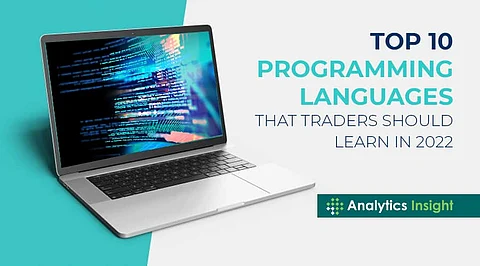

Trading, as a profession, has grabbed eyeballs from everywhere across. With the advancement in technology, the skill set needed for traders is changing. If you are looking to make a career in trading, you must be well acquainted with certain programming languages. Taking this into account, we have come up with the top 10 programming languages that traders should learn in 2022. Have a look!
Python is an open-source programming language that follows a functional programming approach. One of the many reasons why Python makes it into the list of the top 10 programming languages that traders should learn in 2022 is because you can extend python code to trading algorithms that are easy to write. Here, there is no requirement to create as much code as other languages do while creating algorithmic trading programs.
Java is one of the most sought-after programming languages for traders. Data modeling, simulations, and low latency execution are some of the many areas where Java serves to be no less than a blessing. Java is user-friendly, flexible, easy to learn, and offers the competitive advantage of project diversity and high wages. Java's high security is yet another reason why IT corporations such as Netflix, Amazon, Twitter, and more choose to work with it.
This in-demand programming language is extremely easy to pick up and supports imperative, object-oriented, and functional programming. JavaScript is extensively used for building solutions such as financial planning and analysis platforms, vehicle repair management systems, managing label creation, and so much more. No wonder why JavaScript is more than just programming.
Scala is yet another widely-used programming language that has found immense importance in the finance and FinTech industry. Right from data architecture to cloud-based financial platforms, Scala turns out to be everyone's favorite. This language boasts of a concise and compact code that provides support for both object-oriented and functional programming.
C++, a middle-level programming language, is a blessing for traders as the components of High-Frequency Trading (HFT), which are latency-sensitive, are usually developed in C++. This is because C++ is extremely efficient at processing high volumes of data. Additionally, this programming language is used for many banks' legacy systems.
This low-level platform-neutral object-oriented programming language has quite a good number of similarities with that of Java and C++. With C#, one can create complex development projects by simplifying the code and saving development time. This is general-purpose object-oriented programming that benefits traders in every possible way.
It is a well-known fact that any good trading algorithm has to be extensively tested using sample data. This is where R comes into play. R plays a pivotal role when it comes to designing programs that generate trading signals and maximize strategy's returns. All in all, R is that one open-source language that is extensively used in statistics and data analytics.
PHP is yet another popular server-side general-purpose programming language that has a key role to play in the field of data analytics – something that traders are extensively involved in. PHP is stable, secure, highly scalable, and helps developers write test cases and perform testing smoothly.
Another very popular programming language for traders is SQL. It is because this language stands the potential to handle the copious amount of data that our trading industry produces. SQL can analyze historical data, identify patterns and predict future performance using all that information gathered.
MATLAB has gained wide recognition because of its importance in floating-point linear algebra. As far as trading is concerned, this programming language can generate plots and other such interactive tasks which is why it is favored by a majority of the traders out there.
Join our WhatsApp Channel to get the latest news, exclusives and videos on WhatsApp
_____________
Disclaimer: Analytics Insight does not provide financial advice or guidance. Also note that the cryptocurrencies mentioned/listed on the website could potentially be scams, i.e. designed to induce you to invest financial resources that may be lost forever and not be recoverable once investments are made. You are responsible for conducting your own research (DYOR) before making any investments. Read more here.
